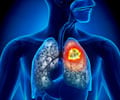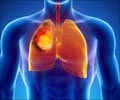Highlights
- About 10% of lung cancers carry a Ataxia-Telangiesctasia mutated (ATM) gene and are not treatable by any drugs.
- These types of cancers are sensitive to drugs that inhibit an enzyme called MEK.
- Inhibition of MEK stops cell proliferation and leads to or cell death.
It remains the leading cause of cancer-related deaths worldwide. Tobacco exposure is the main cause of lung cancer.
Lung cancer is the second most common cancer in both men and women. About 1 out of 4 cancer deaths are from lung cancer . And about 14% of all new cancers are lung cancers.
According to the American Cancer Society, the 2016 estimates for lung cancer in the United States are-
- About 224,390 new cases of lung cancer
- About158,080 deaths from lung cancer
ATM Gene
About 10% of lung tumors carry mutations in a gene called ATM or Ataxia-Telangiesctasia mutated gene and there are no drugs available to treat ATM mutant lung cancer.
MEK inhibitors have been approved for the treatment of a type of skin cancer but not for lung cancer. So this finding is crucial.
The enzyme, MEK is part of a biochemical pathway which is responsible for supporting proliferation and survival of the cell, while ATM plays a central role during the DNA damage response.
In lung cancers that are ATM deficient, researchers found that inhibition of MEK results in cells being unable to keep proliferating and leads to apoptosis or cell death.
"Normally lung cancer cells are resistant to MEK inhibition as they activate compensatory signals," Ferran Fece, one of the two first authors on the study and former PhD student at CeMM, explains. "In contrast, ATM mutant cells fail to do this and subsequently cannot cope with the blocking of MEK and die. We call this type of unexpected drug sensitivity synthetic lethality".
Precision Medicine
The knowledge from these findings could be used for the development of precision medicine.
ATM is found to be mutated in 8-10% of lung adenocarcinomas.
This tumor is most prevalent for both men and women worldwide, and hence a significant number of patients could benefit from a MEK inhibitor based treatment.
Researchers at the CeMM Research Center for Molecular Medicine of the Austrian Academy of Sciences in Vienna and the Ludwig Institute for Cancer Research in Oxford published this finding in the journal Nature Communications.
References
- Key statistics for lung cancer - (http://www.cancer.org/cancer/lungcancer-non-smallcell/detailedguide/non-small-cell-lung-cancer-key-statistics)
- Sebastian Nijman et al. MEK inhibitors block growth of lung tumors with mutations in Ataxia Telangiectasia Mutated. Nature Communications; (2016) DOI: 10.1038/NCOMMS13701
Source-Medindia















